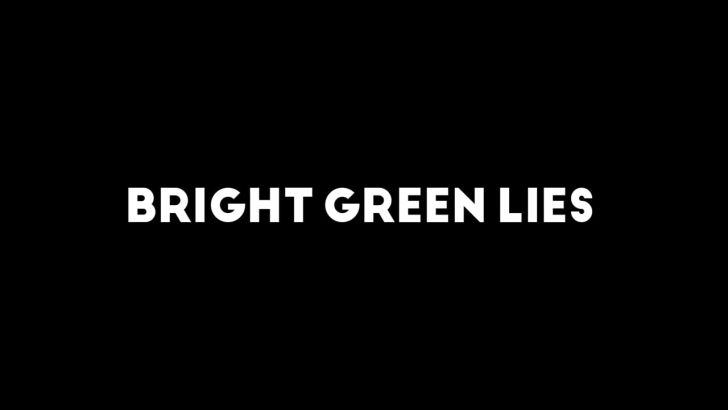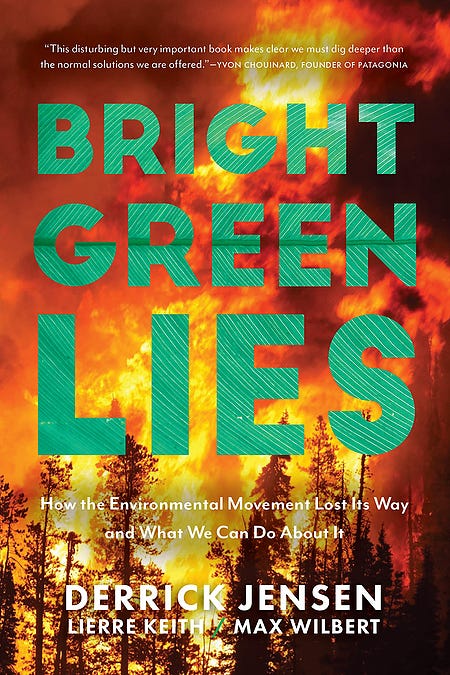Can We Have Both Industrial Civilization and a Habitable Planet?
Does "manufacturing our way out of the problem" preserve the problem itself?
"Companies are involved in these activities to make money. ... What they're actually talking about is sustaining high-energy ways of life at the expense of the natural world."
—Bright Green Lies, trailer
Not long ago I wrote about the problem of stopping climate change, or at least mitigating its worst results, and concluded:
The climate crisis threatens to end our economic system not only if it's ignored. It threatens to end our system if it's addressed.
This is the Catch-22 that makes the coming climate crisis different from a meteor strike, for example. In the meteor case, the current economic order is destroyed only if the meteor lands. Diverting its impact preserves the economic status quo.
Not so the climate. In that case, preserving the economic status quo guarantees collapse, as does the meteor strike, but addressing it effectively also guarantees a different economic and political order, since the current economic and political system cannot address it at all. Quite a dilemma for those presently in charge.
Is the Ruling Class the Problem, or Is It the Economy Itself?
But I think the problem is greater than that; it can't be fixed only by changing the economic order and removing the current ruling class from power. The problem that needs to be fixed is, in fact, modern life itself — specifically, "high energy" life. Watch the trailer for the new film, Bright Green Lies, to see what I mean.
There's a book associated with the film, also called Bright Green Lies, available at a number of places, including here. Its premise is simple:
The only way to build the bright green narrative is to erase every awareness of the creatures and communities being consumed. They simply don’t exist, and if they do exist, they don’t matter. Take, for example, the Florida yew whose home is one single 15-mile stretch, now under threat from biomass production. Or the Scottish wildcat who number a grim 35, all at risk from a proposed wind installation.
“Progress,” Chickasaw writer Linda Hogan reminds us, “is a sort of madness that is a god to people. Decent people commit horrible crimes that are acceptable because of progress.” And so our culture hurtles towards are new industrial paradigm, and the wildcats are consigned to history.
The true facts about supposedly renewable energy are hard, and worse than inconvenient. The first truth is that industrial civilization requires industrial levels of energy. The second is that fossil fuel—especially oil— is functionally irreplaceable. Scaling the current renewable energy technology, like solar, wind, hydro, and biomass, would be tantamount to ecocide. Consider that 12 percent of the continental United States would have to be covered in windfarms to meet current electricity demands. But electricity is only one-sixth of the nation’s energy consumption. To provide for the U.S.A.’s total energy consumption, fully 72 percent of the continent would have to be devoted to wind farms. In reality, solar and wind development threaten to destroy as much land globally as expansion of urban sprawl, oil and gas, coal, and mining combined by 2050.
Third, solar, wind, and battery technology are, in their own right, assaults against the living world. From beginning to end, they require industrial-scale devastation: open-pit mining, deforestation, soil toxification that’s permanent on anything but a geologic timescale, extirpation and extinction of vulnerable species, and use of fossil fuels. In reality, so-called “green” technologies are some of the most destructive industrial processes every invented. They will not save the earth. They will only hasten its demise. [emphasis added]
Don't miss the detail buried in the second paragraph. First, there's not enough land left — after the land required to sustain a seven-billion-plus population — to provide solar and wind farms. Second, building those energy farms is itself a high-energy, destructive industrial process.
So the question we’re left with is simple: Is industrial civilization incompatible with a habitable planet?
The film, which so far I've only seen in part, seems to be clear in its answer: If we try to have both, we'll have neither. Partly because of the reasons hinted at above, and partly because of the definition of life itself. (How bound up in each other are the hundreds of billions of living "things" on the earth? How much is the life of any of them dependent on the lives of them all? If so, what's really alive? The individuals? Or the system itself?)
A Truly Open Question
But I want to leave the question of the viability of industrial civilization open for now, because the implications are so broad. I want to see the numbers on which the conclusion depends, which I think the book provides, though I suspect the authors are way beyond right. It just seems so likely that "manufacturing our way out of the problem" enshrines and preserves the problem itself — manufacturing.
Must we surrender manufacturing to survive? If so, how does that happen?
As many have pointed out, even if an enlightened politician were president (we don't have one), the surest way to get unelected in a hurry is to ask for sacrifice from the modern American people. As Yves Smith pointed out at Naked Capitalism, "The only hope we have of non-catastrophic outcomes is radical conservation, and just about no one in a position of influence is willing to say that. After all, we live in a society where some regard mask-wearing as an unbearable hardship."
My plan is to read the book, watch the film, and make a decision after that. I encourage you to do the same.
And if the answer to the question I posed in the title turns out to be no, I'll try to address that as well. If we're going to be witness to a spectacular sunset-of-the-species, we should at least be attentive and thoughtful about what we're seeing. And even in the direst of circumstances, action — intelligent and well-designed — is always better than passive and pained acceptance.
What Does "Bright Green" Mean?
The term "bright green" describes the kind of environmentalist who proposes industrial solutions to ecological problems. According to the book, these are the classes of environmentalists across the full spectrum:
DEEP GREENS
The living planet and nonhumans both have the right to exist. Human flourishing depends on healthy ecology. To save the planet, humans must live within the limits of the natural world; therefore, drastic transformations need to occur at social, cultural, economic, political, and personal levels.
LIFESTYLISTS
Humans depend on nature, and technology probably won’t solve environmental issues, but political engagement is either impossible or unnecessary. The best we can do is practice self-reliance, small-scale living, and other personal solutions. Withdrawal will change the world.
BRIGHT GREENS
Environmental problems exist and are serious, but green technology and design, along with ethical consumerism, will allow a modern, high-energy lifestyle to continue indefinitely. The bright greens’ attitude amounts to: “It’s less about nature, and more about us.”
WISE USE / ENVIRONMENTAL MANAGERS
Ecological issues exist, but most problems are minor and can be solved through proper management. Natural resources should be protected primarily to enable their continued extraction and human well-being.
CORNUCOPIANS
The earth is made up of resources that are essentially infinite. Ecological problems are secondary. Technology and the economic system—whether free-market capitalism or socialism—will solve all ecological problems.
TECHNOCRATS / TRANSHUMANISTS
Humans should transcend biology by investing heavily in technology. We can also avoid the possibility of human extinction by leaving planet Earth behind, and we should ultimately move toward cybernetic enhancement and uploading human consciousness into machines in order to defeat death.
I hope you will watch the film and/or read the book with me. I'll have much more to say on this subject later.





I'm glad to read this article because I think it is important to call out "greenwashing". I don't understand what a modern version of a low energy lifestyle would be - if such a thing exists or its back to cave-dwelling?? Have also wondered how people hustling to make ends meet can be effective in either calling for change and living the change? Or maybe cynically/realistically, how many people really want to give up their cell phones which I think might be prioritized over food and shelter in our current society.
blowing up mountains? that's not how you get lithium. it's extracted from desert salt flats with electricity... which can be green, lots of sun in the desert.
furthermore.. a huge breakthrough with graphene (made from carbon from hemp waste) makes aluminum ion batteries possible. 3x the storage per weight!
so batteries for everything would be made from unexotic, unmined carbon (from hemp waste) and aluminum. a plentiful easily recyclable metal.